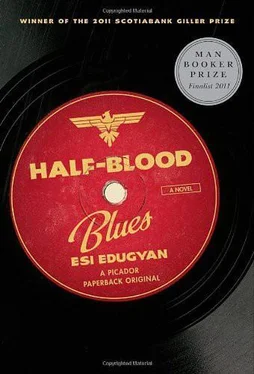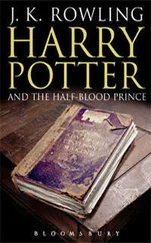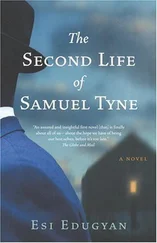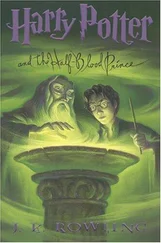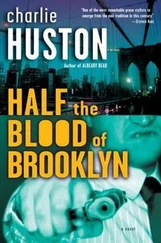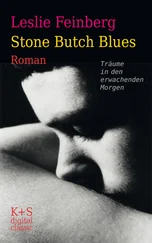‘Chip,’ I whispered, after a long silence. ‘You awake?’
‘No.’
‘You ever think about that Boot? The one you stuck?’
He grunted, rolled over in his sheets. ‘What you mean? You mean like, I ever sorry about it?’
‘I don’t know. Yeah.’
‘No,’ he said. ‘Never.’
We lay on in silence, Chip finally dropping asleep with a loud snore. I stared at the grand high ceiling, feeling anxious, angry. Goddamn kid.
Lilah, she ain’t come home at all. Not the whole damn night.
Delilah had promised us that Armstrong be set to play in two days. Two days — hell . We all known it was a lie.
But it seemed all Paris was waiting too. Anxiety hung over the streets like clothes on a line. When we walked them cobblestones, we seen families huddled in their apartments, crouched over the wireless. Waiters was bent over counters, listening to static. Hell, in those first tender days it seem like everyone was just hunched on up over some radio somewhere, it ain’t mattered where, staying put, like if they moved they might miss the war. First it was the Frogs advancing into the Saar. Then it was the Frogs and the Limeys advancing on the Maginot Line. Then the Krauts was advancing too. Chip, he just shook his damn head. Delilah told rumours of food shortages, but after the darkness of Berlin, all that damn butter and wine in the cafés told us different. It was just fear, we known. Only thing we trusted in all we heard was the static.
Hiero stopped talking in the streets, in the cafés. A damn relief, I thought, the little bastard. Then even the skies drained out. I wished to god I’d just go to sleep and wake up in another reality. Cause I seen what the Krauts was capable of, I ain’t no fool. They like to eat old France down to her crusts. Other days I’d go down to the Seine, lean out over the brown water, think of Paul and Ernst. There was posters going up, shabby gents pasting them along the walls with huge sopping rollers: tots in gas masks, flames, blond mothers herding children into bomb shelters. I watched shop clerks hooking blackout curtains in the windows, and I ain’t felt nothin but nerves.
Cause nothing seemed to happen neither. The Krauts kept on in Poland and the Frogs just waited. It was the beginning of the Phony War, and it was set to drag on through that bleak winter and into spring.
We kept close to Montmartre, to Delilah’s flat, lurking in the Café Coup de Foudre, or drifting aimlessly in the grey streets with our collars turned up. We walked sometimes twenty miles in a day. These was jazz streets, after all. That music done hung its hat here once, drawn near everyone to gig. We passed cheap pensions, abandoned flats where jazz men used to swing. Passed a rundown Le Rat Mort, saw the Big Apple’s narrow door nailed up, drifted past old Bricktop’s where Bechet and McKendrick had spilled out into the street, shooting at each other, both drunk as gulls. Along Rue Pigalle and Rue Fontaine only our own echoing footsteps kept time. We grown lean as greyhounds, our bodies all hope and bone.
And then I just wasn’t thinking of Ernst and Paul so much anymore. My mind turned to Armstrong, to playing with him, and to Lilah too. Wasn’t that my fear left me, it was still there. But a jack just worry and worry and worry, then it dies out in him. Guilt don’t enter into it. I guess folk just ain’t built to be faithful to nothing, not even to pain. Not even when it their own.
Delilah and me was set to have dinner this coming night but now I was dreading it. Sure, wasn’t none of my business where she been on her nights away. But, hell. That kiss.
Worse, seemed she start in on the kid again, fussing over him, paying him all kinds of attention. Luring him from the shell of his damn silences. And he come crawling out. Chip told me all bout it over lunch. How that morning, in the market, the kid been buying her trinkets, cheap tin rings, headscarves and such.
I was grinding my old teeth down to their stumps, hearing him tell it.
‘She was lookin for you too, brother,’ he said.
‘She was there? At the market?’
‘In the bony flesh.’
‘Ain’t that a wonder,’ I said, scowling.
She caught up with us at last that afternoon. We was in Jean’s old music store, where all the gates in Paris gone for the sweet sound, looking for some damn obscure record Chip wanted. It was a dark basement shop, dusty and unswept, and the weak daylight filtered in through high, filthy windows. There was brass horns strung up all about, hanging like a curtain of dead game.
The door banged open, and there she was, descending the stairs in her long heels, laughing, clinging to the kid’s skinny arm. Hell. Something turned in me.
Chip ducked to see round the horns. ‘Hiero, brother, you got a little somethin on you sleeve.’
‘Ooh, boys,’ said Delilah, ‘I’m still shaking.’
‘Hiero’s that good, huh?’ smiled Chip.
At the mention of his name, that scrawny Judas untangled his arm from hers, drifted over. He look embarassed. I moved away, toward the piano.
Lilah laughed. Her crowded teeth shining like rice in her dark mouth. ‘We were just down at Place Pigalle, and who do you think we—’
‘Aw, what you two doin down there?’ I chuckled, forcing a grin. It come out sounding sort of choked. I start to plink nervously on two of the keys.
Chip give me a look.
She furrowed her brow. ‘Who do you think we ran into?’ she finished.
Chip shrugged. ‘George Washington. No, wait. Abe Lincoln.’
‘Jo Baker,’ she said. ‘Josephine Baker.’
Well, ain’t you grand , I thought with unexpected bitterness. Ain’t you special .
Delilah was fussing with the jangling bangles on her wrists. She worn long white gloves. Give me a pang of tenderness, seeing how self-conscious she was. But I dragged it back. I wanted to be annoyed.
I closed the lid of the piano with a heavy thud and she glance over, quick, then look back at Chip. ‘That Jo Baker can put a girl right off her day. She can make you feel like you’re nothing but fluff, just Lou’s bit of fluff.’
‘Aw, girl,’ said Chip. ‘You a lot of things, but you ain’t fluff.’
She looked at him to see if he was mocking. ‘And her sashaying all about town with those ridiculous swans and leopards and god only knows what else all following behind. She puts on such airs. Looks right through you. You ever heard her sing, Chip?’
‘I seen her sing,’ he smiled. ‘It ain’t the same thing.’
‘What’d you think?’
He chuckled. ‘Very talented, what all I could see .’
Lilah made a sour face. ‘She’s just a cheap copy of Addie Hall. You ever heard Addie in person? She’s been doing what Jo does for years. Jo can’t hold a candle to her.’
Then, slow-like, she lift up her green eyes and look at me with real hurt.
Hell. This was my cue. I was meant to say, You know you ten times the woman she is, Lilah girl. You know fame’s comin you way any day now, it ain’t lost you address.
But I ain’t said it. I don’t know, I guess mercy is a muscle like any other. You got to exercise it, or it just cramp right up.
That was the day the consul ordered us home, all Yanks who couldn’t ‘prove they had important business in France’. It was on the radio, in the papers, on the lips of grocers and delivery boys. Seemed every damn American in Paris was buying souvenirs for the voyage west. But, hell. Ain’t nothing more important than backing old Louis.
I met Delilah for a late dinner, just the two of us, at a underground bistro down by the Seine. It been a wine cellar once, and the soft smell of smoked casks come up through the creaking floor. Rickety tables, candlelight, a trellis overhead hairy with vines. The air felt cool in the darkness. First thing she asked about was the consul.
Читать дальше
